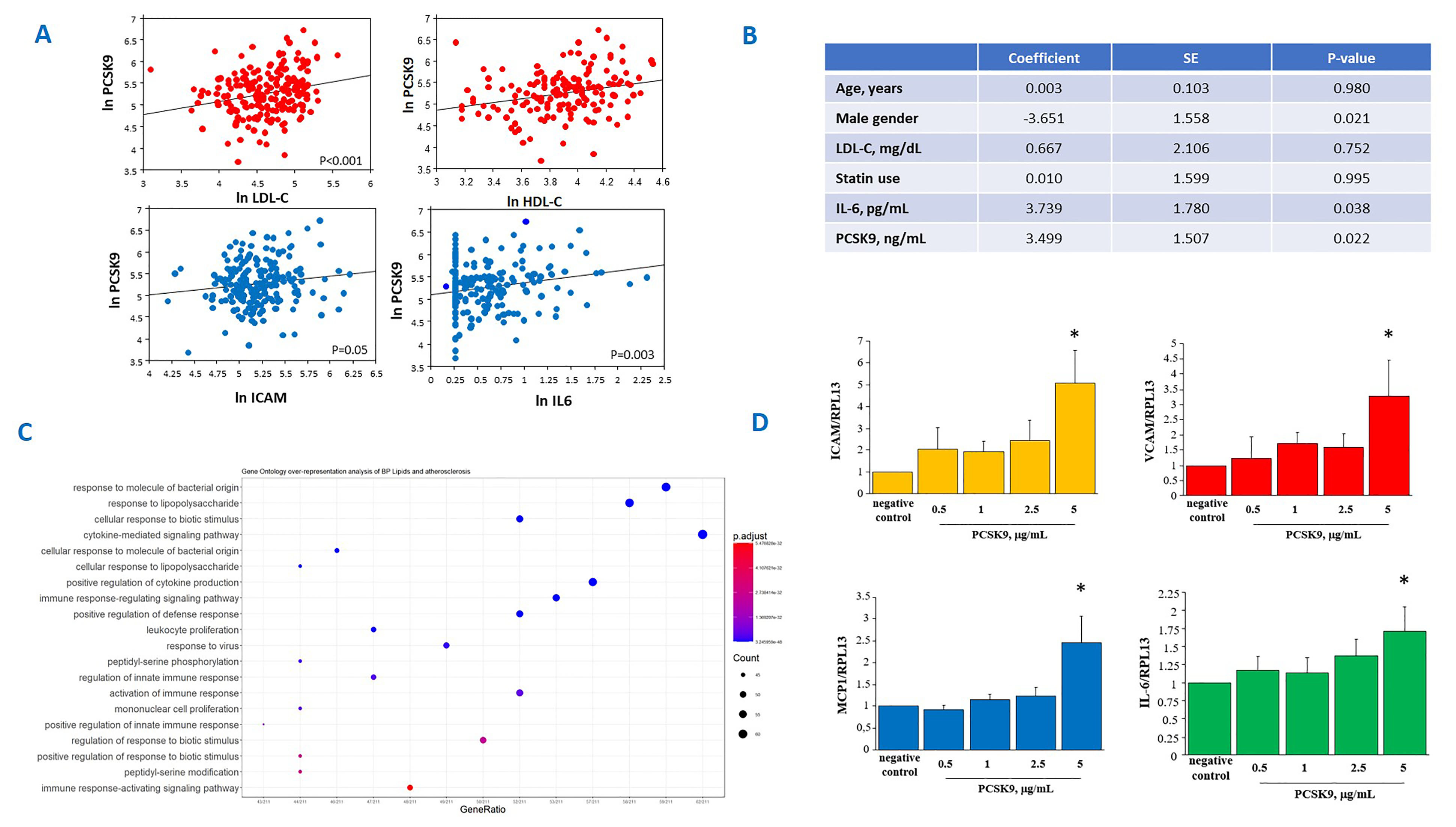Final ID: MDP9
Involvement of PCSK9 in progression of coronary atherosclerosis through molecular mechanisms beyond LDL-cholesterol regulation in patients with chronic coronary disease.
Abstract Body (Do not enter title and authors here): Background. PCSK9, a key regulator of serum LDL-cholesterol levels, is associated with presence and severity of atherosclerosis, but data on the association between PCSK9 and coronary disease progression are lacking.
Hypothesis. Beyond the well-known role on the LDL-C regulation, PCSK9 has been hypothesized to interfere with inflammation and endothelial function affecting atherogenesis.
Aims. The purpose of the present study is to evaluate whether PCSK9 is associated with coronary plaque progression in patients with chronic coronary disease (CCD) and to assess its molecular involvement on fundamental processes conditioning the atherosclerotic process.
Approach. PCSK9 plasma levels were measured in 202 CCD patients (68±7 years of age; 58% males) undergoing coronary computed tomography angiography at baseline and after a follow up period of 6.5±1.1 years to assess progression of Total, Fibrous, Fibro-fatty, Necrotic Core, and Dense Calcium plaque volumes (PV). Molecular pathways linked with PCSK9 were further studied by RNA-sequencing of whole blood and in vitro studies using Human Umbilical Vein Endothelial Cells (HUVEC).
Results. PCSK9 plasma levels were positively related with LDL-C and HDL-C as well as ICAM1, IL6 and MMP9 (Fig A). At multivariate analysis, plasma PCSK9 was associated with annual increase of Necrotic Core PV (Coefficient 3.499, SE 1.507, P=0.022), independently from cardiovascular risk factors, LDL-C, and statin use (Fig B). At RNA-seq analysis, plasma PCSK9 was linked to the expression of genes involved in the regulation of innate-immuno response and cytokine mediated signal pathways (Fig C). A significant increase in ICAM-1, VCAM-1, MCP1 and IL6 expression was observed after treatment of HUVEC with increasing concentration of PCSK9 (Fig D).
Conclusion. In CCD patients, PCSK9 is independently associated with progression of necrotic core PV, possibly reflecting the activity on inflammatory/endothelial pathways conditioning adverse plaque phenotypes. Understanding these mechanisms might shed further light on the therapeutic benefits of PCSK9 inhibitors beyond LDL-C regulation.
Hypothesis. Beyond the well-known role on the LDL-C regulation, PCSK9 has been hypothesized to interfere with inflammation and endothelial function affecting atherogenesis.
Aims. The purpose of the present study is to evaluate whether PCSK9 is associated with coronary plaque progression in patients with chronic coronary disease (CCD) and to assess its molecular involvement on fundamental processes conditioning the atherosclerotic process.
Approach. PCSK9 plasma levels were measured in 202 CCD patients (68±7 years of age; 58% males) undergoing coronary computed tomography angiography at baseline and after a follow up period of 6.5±1.1 years to assess progression of Total, Fibrous, Fibro-fatty, Necrotic Core, and Dense Calcium plaque volumes (PV). Molecular pathways linked with PCSK9 were further studied by RNA-sequencing of whole blood and in vitro studies using Human Umbilical Vein Endothelial Cells (HUVEC).
Results. PCSK9 plasma levels were positively related with LDL-C and HDL-C as well as ICAM1, IL6 and MMP9 (Fig A). At multivariate analysis, plasma PCSK9 was associated with annual increase of Necrotic Core PV (Coefficient 3.499, SE 1.507, P=0.022), independently from cardiovascular risk factors, LDL-C, and statin use (Fig B). At RNA-seq analysis, plasma PCSK9 was linked to the expression of genes involved in the regulation of innate-immuno response and cytokine mediated signal pathways (Fig C). A significant increase in ICAM-1, VCAM-1, MCP1 and IL6 expression was observed after treatment of HUVEC with increasing concentration of PCSK9 (Fig D).
Conclusion. In CCD patients, PCSK9 is independently associated with progression of necrotic core PV, possibly reflecting the activity on inflammatory/endothelial pathways conditioning adverse plaque phenotypes. Understanding these mechanisms might shed further light on the therapeutic benefits of PCSK9 inhibitors beyond LDL-C regulation.
More abstracts on this topic:
84 Immune checkpoint profiling in major aortic diseases leads to identification of potential roles of CD155-CD206 pathway in suppressing inflammation and immune responses
Shao Ying, Saaoud Fatma, Xu Keman, Lu Yifan, Jiang Xiaohua, Wang Hong, Yang Xiaofeng
A Site-by-Site Comparison of CT Attenuation, Effective Atomic Numbers, and Electron Densities of Focal Pericoronary Adipose Tissue and Its Relationship to Adjacent Coronary Plaques on Contrast Enhanced Spectral CTKaneko Aya, Sakaguchi Yamato, Funabashi Nobusada

